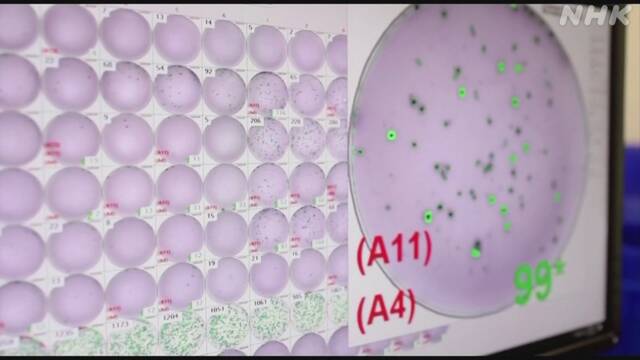Active movement to secure vaccines in Europe, America and China New Coronavirus July 24, 22:56
While the United States, the United Kingdom, and China are advancing the development of a new coronavirus vaccine at an unprecedented speed, the movement to secure a vaccine for their own people is becoming active. In response to these movements, the World Health Organization (WHO) calls for participation in a framework that can stably supply vaccines to developing countries with poor economic power, as it is important that vaccines reach where they are needed.
According to WHO, as of the 24th of this month, a total of 166 types of new coronavirus vaccines are under development worldwide, of which 25 types are actually inoculated into humans and clinical trials to confirm their safety and efficacy have begun. I am.
Of these, the vaccine that Oxford University in the UK is developing with AstraZeneca, a major pharmaceutical company, was announced on the 20th of this month that good results were obtained in a clinical trial conducted on approximately 1,000 people, which is the final stage of development. I am in a three-step test.
The vaccine being developed by NIH = National Institutes of Health and the pharmaceutical company Moderna will also be in Phase 3 trials starting this month.
In addition, the US pharmaceutical company Inovio will soon enter the second stage, and several vaccines being developed by Chinese companies and others have also started the third stage clinical trials, and Dr. Fauci, who is a countermeasure against infection under the US Trump administration. "If all goes well, vaccines will be available at the end of this year or early next year," he said.
The development of vaccines at such an extraordinary speed is supported by the huge amount of money invested by each country, including the United States.
The Trump administration has announced that it will contribute $10 billion to the "warp speed operation" aiming at early vaccine development and supply to its own people, and has already contributed $1.2 billion to AstraZeneca, which is already headquartered in the United Kingdom. In addition to securing 300 million doses of vaccine, it has agreed to pay $1.95 billion and receive 100 million doses of vaccine for successful development by pharmaceutical giant Pfizer.
A senior US government official said on June 16th that the vaccines they have secured will be given the highest priority to supply to their own citizens, saying, "If there is a surplus, it will be sent to other countries."
In Europe as well, the UK has agreed to provide £65.5 million (over ¥8.9 billion) to vaccines developed by AstraZeneca, etc., to receive vaccine supply of 100 million times, and Pfizer etc. We secure the supply.
Last month, four countries, France, Germany, the Netherlands and Italy, formed a group to work together to secure vaccines, supplying up to 400 million doses of vaccine at cost to EU countries. We have an agreement with AstraZeneca to get this.
While developed countries secure huge amounts of funding for vaccines, WHO Executive Secretary Tedros said in April that developing countries should "make sure everyone has what they need." Announced that it will create a collaborative structure with international organizations working to promote the spread of vaccines in Japan to promote equitable distribution of therapeutic drugs and vaccines.
In May, we created an international framework for managing patents and technologies to make it easier to manufacture therapeutic drugs and vaccines in developing countries. Is limited to 39 countries centered on South American countries, and the G7 = 7 major countries such as the United States, which is under active development, has not joined, and its effectiveness is questionable.
Against this backdrop, AstraZeneca has partnered with a vaccine manufacturer in India to supply 1 billion doses to low- and middle-income countries, saying, "We are working hard to spread the vaccine widely and fairly. You can't make a profit by."
On the other hand, China, which is advancing its own vaccine development, has announced that it will also provide vaccines as part of its medical assistance to African countries, and is, so to speak, ready to develop "vaccine diplomacy."

